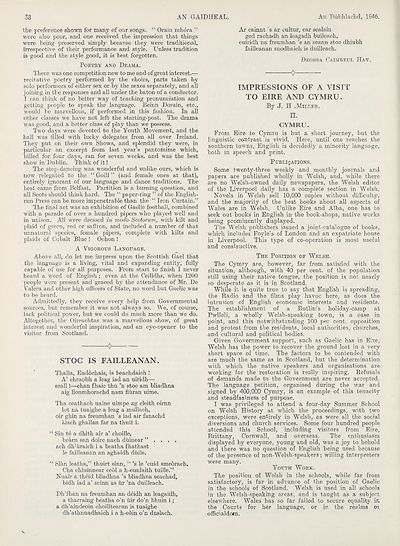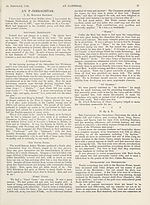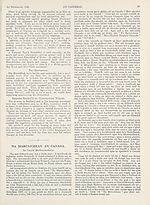An Comunn Gàidhealach Publications > Gaidheal > Volume 42, October 1946--September 1947
(46) Page 38
Download files
Complete book:
Individual page:
Thumbnail gallery: Grid view | List view

An Dubhlachd, 1946.
38 AN GAIDHEAL.
the preference shown for many of our songs. “ Grain mhora ”
were also poor, and one received the impression that things
were being preserved simply because they were traditional,
irrespective of their performance and style. Unless tradition
is good and the style good, it is best forgotten.
PoETKY AND DRAMA.
There was one competition new to me and of great interest.—
recitative poetry performed by the choirs, parts taken by
solo performers of either sex or by the sexes separately, and all
joining in the responses and all under the baton of a conductor.
I can think of no better way of teaching pronunciation and
getting people to speak the language. Beinn Dorain, etc.,
would be marvellous, if performed in this fashion. In all
other classes we have not left the starting-post. The drama
was good, and a better class of play than we possess.
Two days were devoted to the Youth Movement, and the
hall was filled with lucky delegates from all over Ireland.
They put on their own Shows, and splendid they were, in
particular an excerpt from last year’s pantomime which,
billed for four days, ran for seven weeks, and was the best
show in Dublin. Think of it!
The step-dancing was wonderful and unlike ours, which is
now relegated to the “ Goill ” (and female ones at that),
entirely ignorant of our language and dance traditions. The
best came from Belfast. Partition is a burning question, and
all Scots should think hard. The “ paper-ring ” of the English-
run Press can be more impenetrable than the “ Iron Curtain.”
The final act was an exhibition of Gaelic football, combined
with ,a parade of over a hundred pipers who played well and
in unison. All were dressed in modo Scotorum, with kilt and
plaid of green, red or saffron, and included a number of that
unnatural species, female pipers, complete with kilts and
plaids of Cobalt Blue ! Ochon !
A Vigorous Language.
Above all, do let me impress upon the Scottish Gael that
the language is a living, vital and expanding entity, fully
capable of use for all purposes. From start to finish I never
heard a word of English ; even at the Ceilidhs, when 1200
people were present and graced by the attendance of Mr. De
Valera and other high officers of State, no word but Gaelic was
to be heard.
Admittedly, they receive every help from Governmental
sources, but remember it was not always so. We, of course,
lack political power, but we could do much more than we do.
Altogether, the Oireachtas was a marvellous show, of great
interest and wonderful inspiration, and an eye-opener to the
visitor from Scotland.
<>
STOC IS FAILLEANAN.
Thalia, Eudbchais, is beachdaich !
A’ chraobh a leag iad an uiridh—
seall!—chan fhaic thu ’n stoc am bliadhna
aig llonmhorachd nam fiiiran uime.
Tha ceathach uaine uimpe ag cleith oimn
lot na tuaighe a leag a mullach,
oir ghin na freumhan’s iad air fanachd
alach ghallan far na thuit i.
“ Sin te a dhlth air a’ choille,
beam san doire nach diiinear ” . . . .
ach dh’iiraich i a beatha fhathast
le failleanan an aghaidh dhile.
“ Sian leatha,” thuirt sinn, “’s le ’cuid smebrach.
Cha chluinnear cebl a h-eunlaith tuille.”
Nuair a theid bliadhna’s bliadhna seachad,
bidh iad a’ seinn as iir ’na duilleach.
Dh’fhan na freumhan an deidh an leagaidh,
a tharraing beatha o’n Mr do’n bhuin i ;
a dh’aindeoin choilltearan is tuaighe
dh’athnuadhaich i a h-e6in o’n duslach.
Ar cainnt's ar eultur, car sealain
ged rachadh an leagadh buileach,
cuiridh na freumhan ’s an seann stoc dhiubh
failleanan snodhaich is duilleach.
Deorsa Caimbeul Hay.
IMPRESSIONS OF A VISIT
TO EIRE AND CYMRU.
By J. H .Miller.
n.
CYMRU.
From Eire to Cymru is but a short journey, but the
linguistic contrast is vivid. Here, until one reaches the
southern towns, English is decidedly a minority language,
both in speech and print.
Publications.
Some twenty-three weekly and monthly journals and
papers are published wholly in Welsh, and, while there
are no Welsh-owned daily newspapers, the Welsh editor
of the Liverpool daily has a complete section in Welsh.
Novels in Welsh sell 10,000 copies without difficulty,
and the majority of the best books about all aspects of
Wales are in Welsh. Unlike Eire and Alba, one has to
seek out books in English in the book-shops, native works
being prominently displayed.
The Welsh publishers issued a joint-catalogue of books,
which includes Foyle’s of London and an expatriate house
in Liverpool. This type of co-operation is most useful
and constructive.
The Position of Welsh.
The Cymry are, however, far from satisfied with the
situation, although, with 40 per cent, of the population
still using their native tongue, the position is not nearly
so desperate as it is in Scotland.
While it is quite true to say that English is spreading,
the Radio and the films play havoc here, as does the
intrusion of English economic interests and residents.
The establishment of a Butlin’s holiday-camp at
Pwlleli, a wholly Welsh-speaking town, is a case in
point, and this notwithstanding 100 per cent, opposition
and protest from the residents, local authorities, churches,
and cultural and political bodies.
Given Government support, such as Gaelic has in Eire,
Welsh has the power to recover the ground lost in a very
short space of time. The factors to be contended with
are much the same as in Scotland, but the determination
with which the native speakers and organisations are
working for the restoration is really inspiring. Refusals
of demands made to the Government are never accepted.
The language petition, organised during the war and
signed by 400,000 Cymry, is an example of this tenacity
and steadfastness of purpose.
I was privileged to attend a four-day Summer School
on Welsh History at which the proceedings, with two
exceptions, were entirely in Welsh, as were all the social
diversions and church services. Some four hundred people
attended this School, including visitors from Eire,
Brittany, Cornwall, and overseas. The enthusiasm
displayed by everyone, young and old, was a joy to behold
and there was no question of English being used because
of the presence of non-Welsh-speakers; willing interpreters
were many.
Youth Work.
The position of Welsh in the schools, while far from
satisfactory, is far in advance of the position of Gaelic
in the schools of Scotland. Welsh is used in all schools
in the Welsh-speaking areas, and is taught as a subject
elsewhere. Wales has so far failed to secure equality in
the Courts for her language, or in the realms oi
officialdom.
38 AN GAIDHEAL.
the preference shown for many of our songs. “ Grain mhora ”
were also poor, and one received the impression that things
were being preserved simply because they were traditional,
irrespective of their performance and style. Unless tradition
is good and the style good, it is best forgotten.
PoETKY AND DRAMA.
There was one competition new to me and of great interest.—
recitative poetry performed by the choirs, parts taken by
solo performers of either sex or by the sexes separately, and all
joining in the responses and all under the baton of a conductor.
I can think of no better way of teaching pronunciation and
getting people to speak the language. Beinn Dorain, etc.,
would be marvellous, if performed in this fashion. In all
other classes we have not left the starting-post. The drama
was good, and a better class of play than we possess.
Two days were devoted to the Youth Movement, and the
hall was filled with lucky delegates from all over Ireland.
They put on their own Shows, and splendid they were, in
particular an excerpt from last year’s pantomime which,
billed for four days, ran for seven weeks, and was the best
show in Dublin. Think of it!
The step-dancing was wonderful and unlike ours, which is
now relegated to the “ Goill ” (and female ones at that),
entirely ignorant of our language and dance traditions. The
best came from Belfast. Partition is a burning question, and
all Scots should think hard. The “ paper-ring ” of the English-
run Press can be more impenetrable than the “ Iron Curtain.”
The final act was an exhibition of Gaelic football, combined
with ,a parade of over a hundred pipers who played well and
in unison. All were dressed in modo Scotorum, with kilt and
plaid of green, red or saffron, and included a number of that
unnatural species, female pipers, complete with kilts and
plaids of Cobalt Blue ! Ochon !
A Vigorous Language.
Above all, do let me impress upon the Scottish Gael that
the language is a living, vital and expanding entity, fully
capable of use for all purposes. From start to finish I never
heard a word of English ; even at the Ceilidhs, when 1200
people were present and graced by the attendance of Mr. De
Valera and other high officers of State, no word but Gaelic was
to be heard.
Admittedly, they receive every help from Governmental
sources, but remember it was not always so. We, of course,
lack political power, but we could do much more than we do.
Altogether, the Oireachtas was a marvellous show, of great
interest and wonderful inspiration, and an eye-opener to the
visitor from Scotland.
<>
STOC IS FAILLEANAN.
Thalia, Eudbchais, is beachdaich !
A’ chraobh a leag iad an uiridh—
seall!—chan fhaic thu ’n stoc am bliadhna
aig llonmhorachd nam fiiiran uime.
Tha ceathach uaine uimpe ag cleith oimn
lot na tuaighe a leag a mullach,
oir ghin na freumhan’s iad air fanachd
alach ghallan far na thuit i.
“ Sin te a dhlth air a’ choille,
beam san doire nach diiinear ” . . . .
ach dh’iiraich i a beatha fhathast
le failleanan an aghaidh dhile.
“ Sian leatha,” thuirt sinn, “’s le ’cuid smebrach.
Cha chluinnear cebl a h-eunlaith tuille.”
Nuair a theid bliadhna’s bliadhna seachad,
bidh iad a’ seinn as iir ’na duilleach.
Dh’fhan na freumhan an deidh an leagaidh,
a tharraing beatha o’n Mr do’n bhuin i ;
a dh’aindeoin choilltearan is tuaighe
dh’athnuadhaich i a h-e6in o’n duslach.
Ar cainnt's ar eultur, car sealain
ged rachadh an leagadh buileach,
cuiridh na freumhan ’s an seann stoc dhiubh
failleanan snodhaich is duilleach.
Deorsa Caimbeul Hay.
IMPRESSIONS OF A VISIT
TO EIRE AND CYMRU.
By J. H .Miller.
n.
CYMRU.
From Eire to Cymru is but a short journey, but the
linguistic contrast is vivid. Here, until one reaches the
southern towns, English is decidedly a minority language,
both in speech and print.
Publications.
Some twenty-three weekly and monthly journals and
papers are published wholly in Welsh, and, while there
are no Welsh-owned daily newspapers, the Welsh editor
of the Liverpool daily has a complete section in Welsh.
Novels in Welsh sell 10,000 copies without difficulty,
and the majority of the best books about all aspects of
Wales are in Welsh. Unlike Eire and Alba, one has to
seek out books in English in the book-shops, native works
being prominently displayed.
The Welsh publishers issued a joint-catalogue of books,
which includes Foyle’s of London and an expatriate house
in Liverpool. This type of co-operation is most useful
and constructive.
The Position of Welsh.
The Cymry are, however, far from satisfied with the
situation, although, with 40 per cent, of the population
still using their native tongue, the position is not nearly
so desperate as it is in Scotland.
While it is quite true to say that English is spreading,
the Radio and the films play havoc here, as does the
intrusion of English economic interests and residents.
The establishment of a Butlin’s holiday-camp at
Pwlleli, a wholly Welsh-speaking town, is a case in
point, and this notwithstanding 100 per cent, opposition
and protest from the residents, local authorities, churches,
and cultural and political bodies.
Given Government support, such as Gaelic has in Eire,
Welsh has the power to recover the ground lost in a very
short space of time. The factors to be contended with
are much the same as in Scotland, but the determination
with which the native speakers and organisations are
working for the restoration is really inspiring. Refusals
of demands made to the Government are never accepted.
The language petition, organised during the war and
signed by 400,000 Cymry, is an example of this tenacity
and steadfastness of purpose.
I was privileged to attend a four-day Summer School
on Welsh History at which the proceedings, with two
exceptions, were entirely in Welsh, as were all the social
diversions and church services. Some four hundred people
attended this School, including visitors from Eire,
Brittany, Cornwall, and overseas. The enthusiasm
displayed by everyone, young and old, was a joy to behold
and there was no question of English being used because
of the presence of non-Welsh-speakers; willing interpreters
were many.
Youth Work.
The position of Welsh in the schools, while far from
satisfactory, is far in advance of the position of Gaelic
in the schools of Scotland. Welsh is used in all schools
in the Welsh-speaking areas, and is taught as a subject
elsewhere. Wales has so far failed to secure equality in
the Courts for her language, or in the realms oi
officialdom.
Set display mode to:
![]() Universal Viewer |
Universal Viewer | ![]() Mirador |
Large image | Transcription
Mirador |
Large image | Transcription
| An Comunn Gàidhealach > An Comunn Gàidhealach Publications > Gaidheal > Volume 42, October 1946--September 1947 > (46) Page 38 |
|---|
| Permanent URL | https://digital.nls.uk/125249856 |
|---|
| Description | This contains items published by An Comunn, which are not specifically Mòd-related. It includes journals, annual reports and corporate documents, policy statements, educational resources and published plays and literature. It is arranged alphabetically by title. |
|---|
| Description | A collection of over 400 items published by An Comunn Gàidhealach, the organisation which promotes Gaelic language and culture and organises the Royal National Mòd. Dating from 1891 up to the present day, the collection includes journals and newspapers, annual reports, educational materials, national Mòd programmes, published Mòd literature and music. |
|---|---|
| Additional NLS resources: |
|

